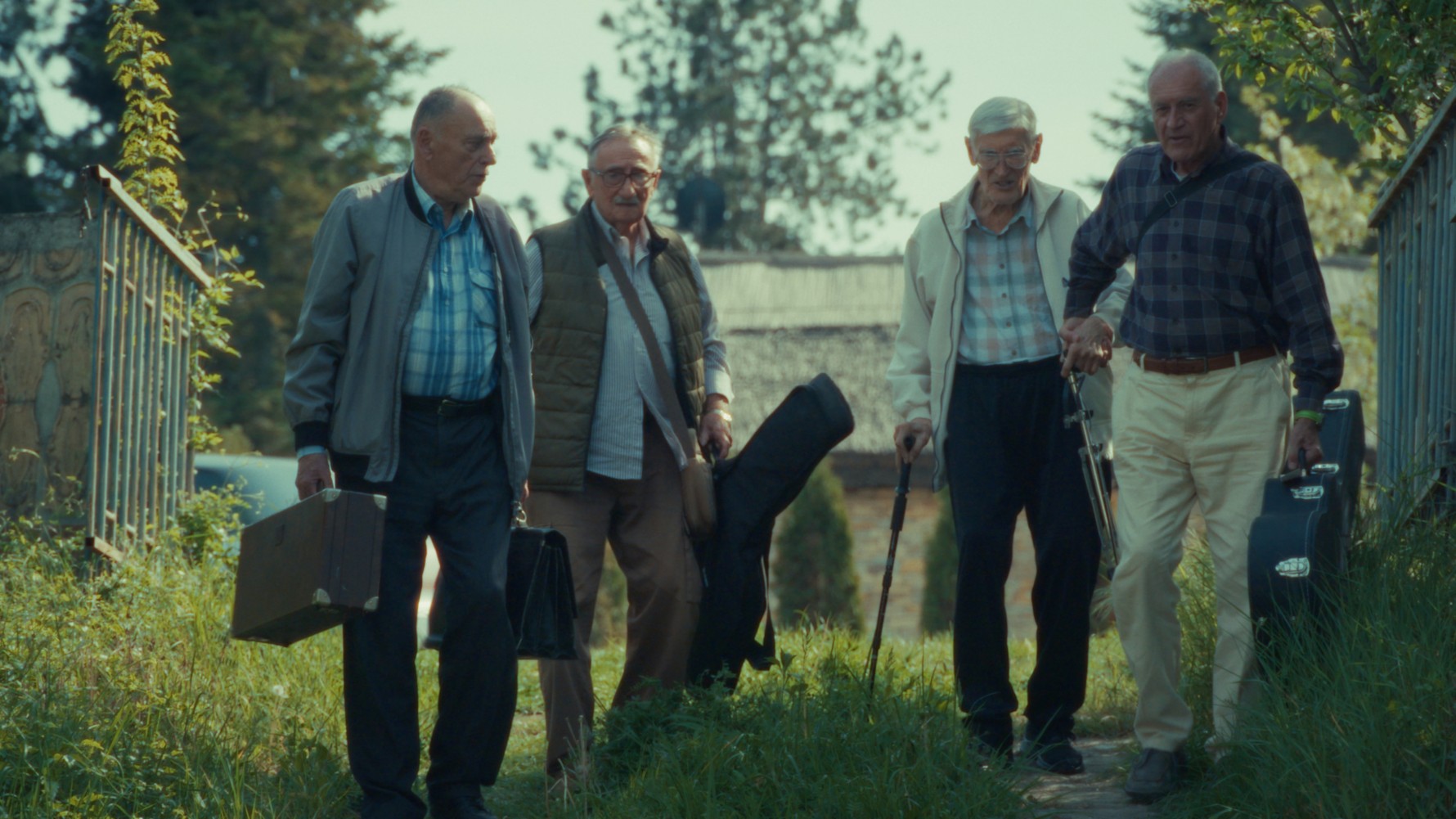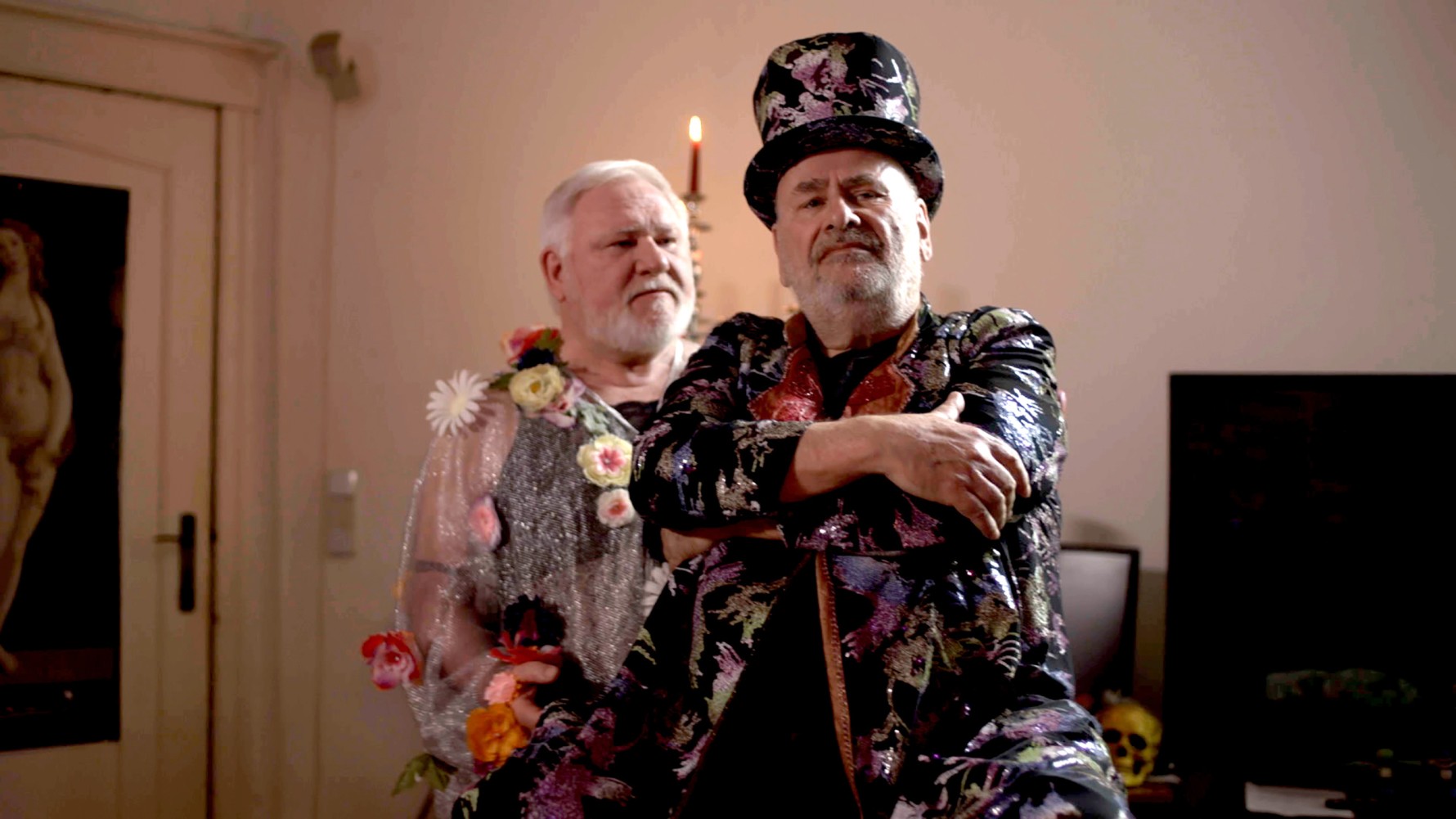Papas Kino: Three Legendary Filmmakers at Berlinale 2025
“As we are leaving for this year’s Berlinale in 20 days or so, I looked at the programme of all the sections on the Internet. So many new names! I will try to watch films by young people. I will try to watch films by young authors, as many as I possibly can,” Želimir Žilnik told Film New Europe.
Of course, at Berlinale, everyone is waiting for the new historic moment in cinema. A new name, a new beginning – nouvelle, nuovo, in the continuous future. It’s a strange industry, increasingly obsessed with youth as it ages – the same industry that, let’s not forget, in 2014 awarded Xavier Dolan and Jean-Luc Godard the Jury Prize at Cannes for the sake of a rather silly 1+1. This year, we all watched Timothée Chalamet in Berlin promoting his latest film, Bob Dylan: A Complete Unknown, and although he was careful to remind everyone that Dylan “is alive and well,” his statements about the musician felt like an evasive, generically polite in memoriam. After all, who in Hollywood would really care about the story of old Dylan, a living dead (and vice versa) in the eyes of the industry?
With Dylan on my mind, during Berlinale I was especially drawn to the latest titles by baby boomers – the children of World War II, the radicals of the ’70s, those now preoccupied mainly with the passage of time: Želimir Žilnik, James Benning, and Rosa von Praunheim, all born in 1942. Of course, let’s be honest, it’s not exactly hard to find three films by white men over 80. Many would argue the opposite. And yet, to have these three at the same edition of Berlinale – Žilnik and Benning in Forum, von Praunheim in Panorama – precisely these three radicals whose (self-)depiction of old age was bound to be anything but conventional, now that is a small yet significant event in itself. Even more so because each film, as expected, is deeply concerned with time.
During Berlinale I was especially drawn to the latest titles by baby boomers – the children of World War II, the radicals of the ’70s, those now preoccupied mainly with the passage of time: Želimir Žilnik, James Benning, and Rosa von Praunheim, all born in 1942.

Žilnik’s “comeback” was the most warmly received of the three, partly because it had a special choreography – back in 1969, the Serbian filmmaker won the Golden Bear for Early Works, his debut feature; now, 56 years later, Eighty Plus opened the Forum section, setting a ceremonial tone. Yet everyone – press, industry, audience – seemed to be thinking the same thing: 80+ is soft, old-fashioned, even sappy, a contrasting “late work”. The film, a playful hybrid of telenovela-like fiction and documentary, tells the story of Stevan Arsin (Milan Kovačević), an elderly jazz pianist who emigrated to Germany during the Yugoslav communist era and has now returned to contemporary Serbia to reclaim the family mansion where he grew up, which was nationalized during the socialist period.
A new film about migration – nothing could be more Žilnik. He has spent his entire career fascinated (and outraged) by the political upheavals of displacement, having himself emigrated to West Germany for a few years under Tito. Over the decades, his cinema has been filled with all kinds of wanderers, especially the most vulnerable ones: seasonal workers in the West, African students in Yugoslavia, Serbian labor migrants, Asian hairdressers in Budapest, war refugees – the unlikely but especially the most likely figures of a true police-controlled Tower of Babel. It’s easy to see why the story of Stevan, who returns to Serbia after a fairly comfortable life as a club musician in Germany (having left sometime in the ’60s), and who now seeks to inherit a massive villa, creates tension – both within Žilnik’s filmography and within the film itself, between Stevan and the other characters, the locals and his estranged family. Someone who has only ever imagined the Yugoslav Wars, who watched the breakup of Yugoslavia on TV, who doesn’t flinch at air raid alarms and has never wondered what he could have done to prevent the atrocities committed by his own people – such a person is bound to be viewed with suspicion by those who lived through it, whose wariness intertwines with their immediate desire to claim the property for themselves.
The story of Stevan, who returns to Serbia after a fairly comfortable life as a club musician in Germany (having left sometime in the ’60s), and who now seeks to inherit a massive villa, creates tension – both within Žilnik’s filmography and within the film itself. It’s not so much the opportunism of those around him that unsettles him, but rather the sheer, unprecedented accumulation of history in these strange and belated moments of his life. For now, this is Žilnik’s revolt – directed mainly against the vulgar materialization of old age.
Thus, Eighty Plus unfolds as an honest Balkan telenovela about money, family, and politics, with classical music blaring and a peculiar kind of acting – not professional, true (most performers are amateurs), but also flattened by Žilnik’s staging, which is stingy with epiphanies and accustomed to working with minimal resources. And yet, Stevan, as played by Kovačević, seems to belong to an entirely different film – he is a serene, likable, non-confrontational figure, almost stripped of drama in the way he responds to others’ provocations. He appears to be on a mission to put the house back in his name, restoring it to how it was before Serbian capitalism, before the fratricidal war, before Yugoslav communism, before Croatian fascism – before all this history that is foreign to him. It’s not so much the opportunism of those around him that unsettles him, but rather the sheer, unprecedented accumulation of history in these strange and belated moments of his life.
For now, this is Žilnik’s revolt – directed mainly against the vulgar materialization of old age. In the end, like any true boomer, Stevan dreams of breaking free. I understand why a silly film like this can also be a story of liberation.

Yes, maybe Eighty Plus is below expectations, but it cannot be compared to Rosa von Praunheim’s new film, Satanische Sau (Satanic Sow), which might fluster even the screen it’s projected on; at the same time, it must be said that it’s an infinitely more interesting film than Žilnik’s. A pioneer of gay cinema and activism in West Germany (It Is Not the Homosexual Who Is Perverse, But the Society in Which He Lives, his feature debut, being one of the seminal queer films), von Praunheim is a true national legend who, for some years now, hasn’t translated very well into other languages. To be honest, his presence at the Berlinale, as well as this year’s Teddy Award for the best queer documentary film, is due primarily to the national prestige he enjoys. And that’s because, unfortunately, he doesn’t seem to have much left to say after decades of confronting representation issues through scandalous, angry, “vulgar,” camp, and cheap films.
Now, after dozens of such films, von Praunheim has earned the right to make Satanische Sau, a patchwork of older footage (for example, from the much more successful Neurosia – 50 Jahre pervers / Neurosia: Fifty Years of Perversion, another autofiction about von Praunheim’s life from exactly 30 years ago) and more recent material. The latter is a true self-delirium in which the filmmaker invites actor Armin Dallapiccola to engage in a kind of cinematic performance where their biographies intertwine with the mockery of a fictional role: neither Armin Dallapiccola nor Rosa von Praunheim, but a Frankenstein – Armin Peter von Mehl in his final days.
“Satanische Sau” can be a true radical spectacle of old age – and its protagonist is a real showman whom you lose sight of only when rolling your eyes. Armin is loud, whiny, spoiled, unbearable, lascivious, and capricious; nothing he says or does is self-evident for old age – in fact, there is hardly any gay old age represented in mainstream media, let alone provocative gay old age.
As I said, von Praunheim, who releases about one feature film per year, has earned the right to make cheap, fast films that are perfectly aware of their own bad taste. The problem is, that’s not enough: speed and shortcuts should serve ideas, not be ideas in themselves. Of course, Satanische Sau can be a true radical spectacle of old age – and its protagonist is a real showman whom you lose sight of only when rolling your eyes. Armin is loud, whiny, spoiled, unbearable, lascivious, and capricious; nothing he says or does is self-evident for old age – in fact, there is hardly any gay old age represented in mainstream media, let alone provocative gay old age. And this, along with the freedom of excessive imagination and arte povera (for instance, a shot of plush toys copulating), are, in themselves, good ideas – not good enough, however, to carry Satanische Sau to the finish line.

From Žilnik to von Praunheim, a huge difference is already felt – one dreams of a hedonistic old age, free from trivialities and responsibilities, while the other, as a homosexual (no family, etc.) and more politically lucid, wants to turn his old age, ignored and ridiculed, into everyone’s problem. Well, little boy, James Benning’s new film, is something else entirely – first of all, because it makes the other two films seem like big-budget blockbusters, being truly a film made out of nothing. Then, Benning is neither a biographer like Žilnik nor an autobiographer like von Praunheim, but rather the opposite: when he tells a “story” (rarely), it is only vaguely human (Benning’s cinema encourages an equality of gaze, where a person is just as important within the filmic composition as anything else) and suspended in space and time, the narrative being mysterious, fragmented, interrupted by dead time, a scenic interest in the background (fields, roads, parking lots, forests, lakes – generally open spaces that question private property or human intervention), and sometimes a pop-art delight in the all-encompassing “signs” of contemporary ideology: hit songs, advertisements, and the like.
When he doesn’t tell a story, he shows it happening diffusely, often within rigid structures (ten shots of ten minutes each, eight shots of fifteen minutes, etc.) that define his surroundings (America and Americana), fully aware that every landscape supports a narrative, just as the canvas supports a painting. A cartographer who wants to measure, frame by frame, the entire America, keeping an almost ancestral secret that the first-person perspective is not inside but everywhere outside, Benning has thrived for nearly 50 years on the paradox that sustains his cinema. On one hand, he is, for lack of a better term, a practical filmmaker, an anti-illusionist who works with his hands in sight, using what can be seen and heard. A no-bullshit kind of guy. At the same time, through very simple sound + image calculations, Benning aims to encompass very big ideas – and although at this point I’d say I can appreciate his films almost unconditionally, it’s clear to me that his conceptual approach to filmmaking operates on a very thin line between masterpiece and failure.
little boy feels like a conceptual stutter, a failure in a filmography that, as a whole, I consider a masterpiece. Thus, his latest film actually tells, in fragments, the story of the 80 years he has lived, but through a history of rhetoric, of speeches that have shaped postwar American politics – from the atomic bomb to the climate crisis. And each speech is part of a triptych. First, we see a pair of hands working in a workshop, assembling a toy model that will become a factory, a house, a public building, etc. The image of the model is accompanied by a speech (on racial segregation, Eisenhower’s famous farewell speech warning about the Cold War’s military-industrial complex, on American intervention in the Middle East, etc.) and a song – for example, Pete Seeger’s What Did You Learn In School Today?
“little boy” feels like a conceptual stutter, a failure in a filmography that, as a whole, I consider a masterpiece. Thus, his latest film actually tells, in fragments, the story of the 80 years he has lived, but through a history of rhetoric, of speeches that have shaped postwar American politics – from the atomic bomb to the climate crisis.
Somehow, despite its very rigid structure, the film feels quite playful and loose on the big screen. When it stops being perfectly opaque (Benning’s eternal paradox: his radical simplicity, incomprehensible as a viewer experience), little boy invites recognition – it is, after all, a compilation of defining moments for our reality today, a pocket-sized history told in unusual ways, but that’s the least interesting part of the whole endeavour. Benning himself is what’s truly interesting here, through the perfectly effaced yet still evident autobiographical aspect (the selection of speeches and songs being his and his alone). And, most of all, through the idea of making a film not about his own old age, but about the passage of time – and indeed, seeing him on stage and hearing his flat it is what it is answers, it’s clear to me that Benning is a great artist precisely because, for him, even his own old age is what it is.
Film curator, writer and editor, member of the selection committees of BIEFF and Woche der Kritik, FIPRESCI member and alumnus of the film criticism workshops organized by the Sarajevo, Warsaw and Locarno film festivals. Teaches a course on film criticism and analysis at UNATC. He has curated programs for Cinemateca Română, Short Waves, V-F-X Ljubljana, Trieste Film Festival, as well as the Bucharest retrospective of Il Cinema Ritrovato on Tour in 2024 and 2025.


